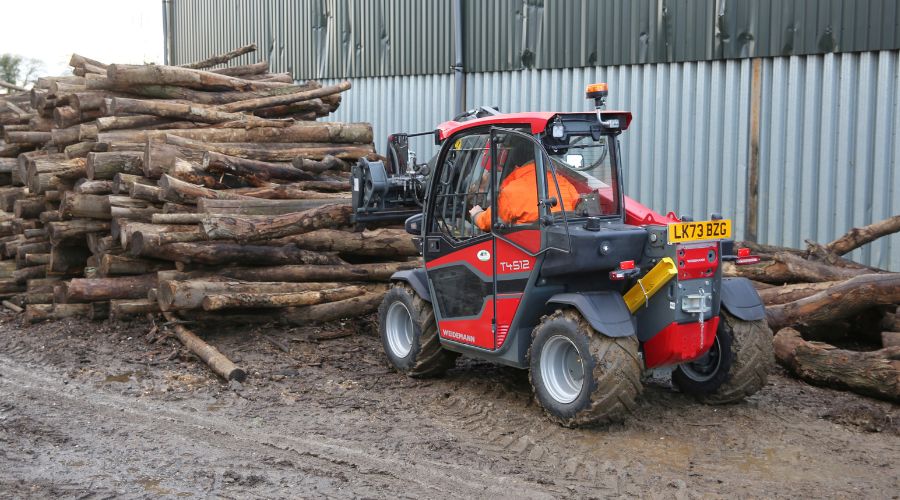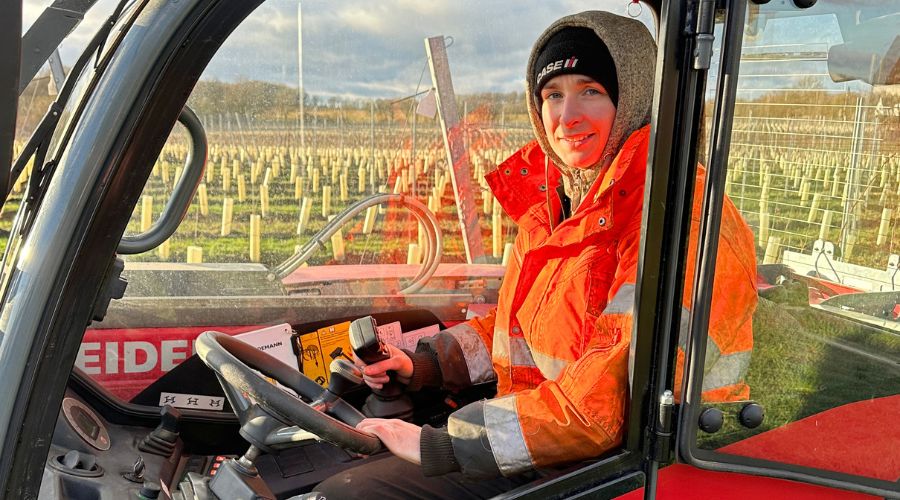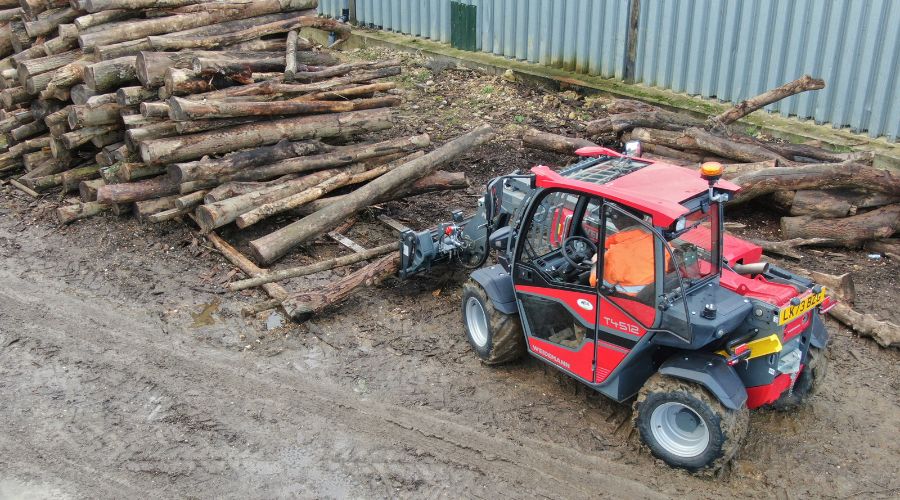Vineyard handling easier with new compact handler
18th February 2025
A compact handler selected for a busy Hertfordshire firewood supply business is proving even better suited to working in the estate’s expanding vineyards. David Williams reports.

Chaldean Vineyard has quickly gained a reputation for its grape production. In 2019, 18,500 vines were established on 4ha of south-facing slopes within the 1,155ha Chaldean Estate, as the farm’s owners saw opportunities to diversify from traditional arable crops.
The first area planted, Hadham Hills, is now an established vineyard producing Pinot Noir and Chardonnay grapes under contract for Bolney Wine Estate in West Sussex, to be made into English sparkling wine.
In 2023, a further 6ha of vines were planted, again replacing arable crops. Varieties include Bacchus, Pinot Noir and Chardonnay. The first year’s growth was encouraging, and the Great Field vineyard is expected to produce viable quantities of crop by 2027. A third vineyard is already planned and due to be planted this year with an equal split of Chardonnay, Pinot Grigio and Sauvignon, increasing the total area under vines to 16ha.
Soil types ideal
“Diversifying into vine growing here makes a lot of sense,” explained estate manager, Alan Granger. “Our land is free draining with soils over chalk, and the soil composition is like the best wine producing areas of France.
As long as we have suitable weather then we can produce enough grapes of the right quality to make the enterprise profitable. As average temperatures increase through climate change, then growing conditions should further improve, so we see the diversification as protecting the estate for the future.”
The vineyards were planned and established in conjunction with Essex-based Tom Bunting Vineyard Management, and a full-time manager is employed and responsible for general vineyard operations.
Firewood enterprise
Thirty-eight separate areas of woodland are managed with guidance from the Forestry Commission. Rotational coppicing and felling of small blocks provide a supply of wood for the estate’s biomass boilers, and each year 250–300t of firewood is sold in large bags and delivered locally.
“A lot of the firewood we sell is ash, as large numbers of our trees have succumbed to ash dieback,” continued Alan. “The wood is transported to our yard where it is cut into logs and split by a firewood processor, then it is loaded into large bags and stored in a barn. Everything we sell is under 20% moisture, and our busy firewood supply business caters for customers within 20 miles radius of our base.”
To efficiently handle and stack the bags of firewood in limited space in the barn, a highly manoeuvrable, compact loader was needed.
“We used a tractor and front-end loader previously which wasn’t ideal. When our farm manager called into PHR Agricultural Engineering Ltd, he saw the Weidemann compact telescopic handler there in the yard. It looked ideal for our needs, so he had a brief test drive which impressed him, so he suggested that I also called in to have a look.
“I agreed that it was just what we needed. As we already dealt with the team at PHR Agricultural Engineering we knew we could rely on the back-up available, so we placed an order, and the machine arrived in September 2023.”

Ideal vineyard compact handler
Although the Weidemann was bought primarily for firewood handling and loading, it quickly proved just as well suited to use in and around the vineyards.
Previously, during harvest a specialist narrow vineyard tractor with pallet forks on the rear linkage moved plastic bins of harvested grapes to the headlands ready for loading by one of the farm’s full-size telescopic handlers, but the operation was labour intensive, and both machines were always needed as the tractor couldn’t load the bins onto the trailers and the large handlers couldn’t fit down the narrow rows.
The Weidemann is ideal for the task. At just 1.56m wide, it easily fits between the vine rows, while the light weight helps avoid soil compaction which can be an issue with larger machines. It is now relied on during harvest to collect bins of harvested grapes, transport them to the headlands and then load them straight onto the trailers, although during peak harvesting season the tractor also fetches bins and delivers them to the headland ready for loading by the handler.
Incredibly versatile
The compact handler is also used during general vineyard maintenance. It carries tools and supplies around the site and, during construction of the new vineyard in late 2023, it transported all the fence posts and mesh fencing from the yard to the field. It also makes easy work of loading large bags of fertiliser into the tractor-mounted spreader.
A variety of attachments are used. These include pallet forks, a large bucket, a bucket with an integral hydraulic rotary sweeper and a hydraulic log grab.
Vineyard manager, Emma Gattlin said the handler is incredibly versatile. “For vineyard operations as well as handling bags of logs the lift capacity is more than adequate, and I’m amazed at how easily it handles the loads even when the boom is fully extended.
“The cab is comfortable; it’s quiet so I can easily hear the radio and the heater works well. The upper section of the door can be fastened in the open position for ventilation and it makes communication with others in the working area easier too, so operation is safer. Daily checks are easily carried out within just a few minutes and there is convenient access to the filters for cleaning. It’s all good.”

Safe operation
Like larger agricultural and industrial telescopic handlers, the Weidemann has a built-in overload protection system. “It doesn’t affect day-to-day operation as almost everything we lift is well within its capabilities,” Emma continued. “However, if it does cut in then all boom movement stops except lowering, so the user must be aware of how to reduce the overload issue and regain normal operation. It’s not a problem.”
Emma also likes the automatic handbrake. “I find it reassuring. As soon as the operator leaves the seat or selects neutral, the handbrake engages. So, even if the driver is only leaving the cab for a few seconds to adjust a lift strap or open a gate and forgets to set the brake, there is no risk that the machine might start to roll.
“It also saves those occasions when I get out and then wonder if I engaged the handbrake properly or not. I always make a point of setting it, but it’s a reassuring feature anyway.”
Daily use
During the first 18 months after the compact handler was delivered, it recorded more than 700 working hours. “It’s used every day, mainly for firewood handling in the winter and in the vineyard from spring until autumn,” said Alan. “It’s used by the farm team occasionally too, if their own two handlers are busy elsewhere and lorries need unloading.”
Dealer view
The Weidemann has been completely reliable. “We took on the Weidemann franchise two and a half years ago, partly because of the brand’s strong reputation for build quality and reliability,” explained PHR Agricultural Engineering director, Dave Baverstock.
“The range includes a useful variety of model sizes, and these compact machines are especially popular in any environment where space is restricted such as on construction sites or for use in poultry or pig sheds.
“The ability to lift more than a tonne but still offer such great manoeuvrability from such a neat package makes the T4512 especially well suited to vineyard work. Conventional industrial forklifts are ok for yard handling tasks, but they lack the reach of the Weidemann’s telescopic boom and would struggle to travel on soft or uneven ground.
“This machine is the ideal solution, so I’m not surprised that it’s proving so popular with the Chaldean Vineyard team. Many more vineyards are being established across our trading area, so we expect more enquiries and sales.”
Increasing workload
Alan said that the handler’s workload will increase as the new vineyards commence commercial production. “Working with Tom Bunting Vineyard Management to establish and manage the vineyards works well, and the company has its own team of pickers who help us hand-pick our crop currently.
“However, we will invest in more mechanisation as it is needed. We are pleased with the yield and quality from our first vineyard so far, and as well as planning our third vineyard now, we are also looking at trials of red varieties as we believe demand for English grown crop will grow.
“Emma currently applies crop protection treatments using a 400-litre sprayer, but our plan is to purchase a larger 1,200-litre applicator with recirculation and a drift recovery system to increase work rates while also reducing chemical costs, and which will be better for the crop and the environment too.
“As the enterprise grows, the Weidemann compact handler’s work will increase too, and I remain pleased with our decision to buy it. Most things we handle are on pallets and weigh a tonne or less, and the T4512 has capacity to spare.”
The right machine for the task
“I can’t fault it,” concluded Emma. “Considering the machine is so compact, the cab remains comfortable, and it feels surprisingly spacious.
The fuel consumption is minimal. It depends on what sort of work we are doing but, although the tank holds only 33 litres, we tend to refuel every 7–14 days.
“If we were choosing again, then this is the machine I would want.”
